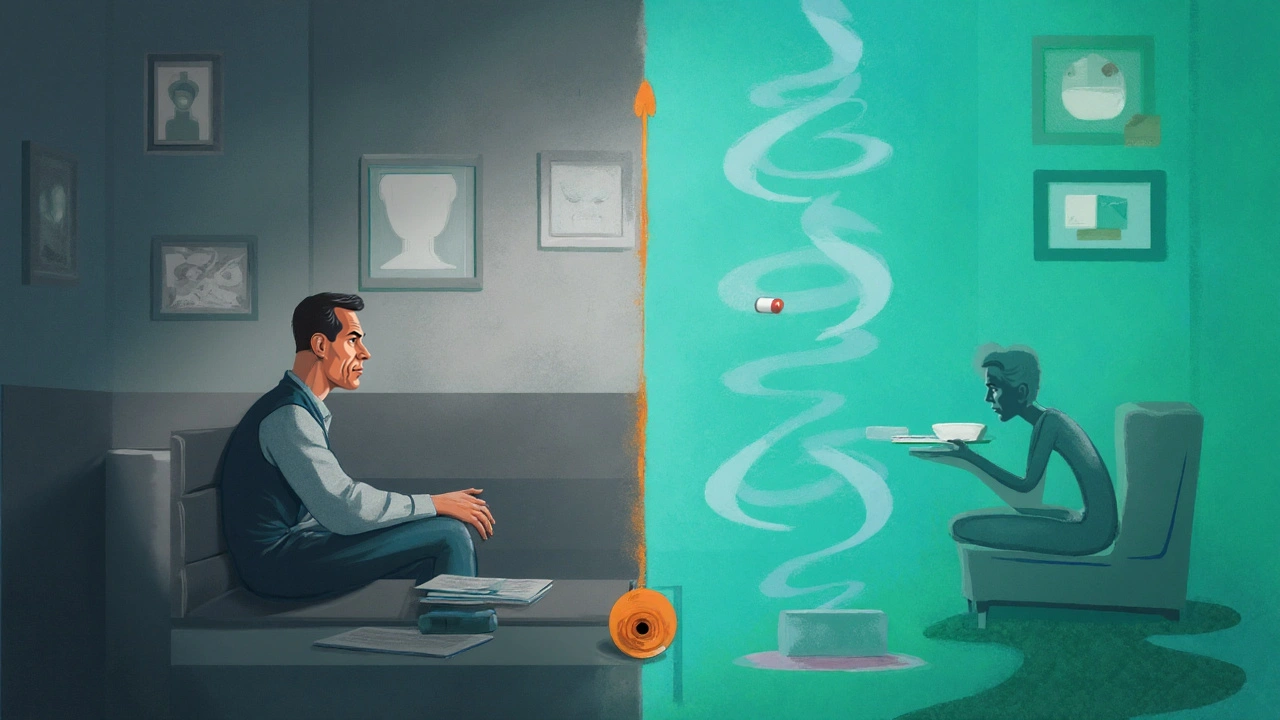Hepatic Encephalopathy is a neurological syndrome caused by liver dysfunction that leads to a buildup of toxins, primarily ammonia, affecting brain function. While doctors often focus on the physical signs-confusion, asterixis, or altered consciousness-a growing body of research highlights how this condition hijacks emotions, thinking patterns, and relationships. If you or a loved one have been diagnosed, the emotional fallout can feel just as bewildering as the physical symptoms. Below we break down what happens in the brain, why mood swings are common, and what you can do right now to protect mental health.
Why the Brain Gets Cloudy: The Role of Ammonia and Neuroinflammation
Ammonia is a nitrogen‑bearing compound produced during protein digestion; normally the liver converts it to urea for safe excretion. When the liver is scarred by Liver Cirrhosis (advanced fibrosis that impairs detoxification) the organ can’t clear ammonia efficiently. The toxin slips into the bloodstream, crosses the blood‑brain barrier, and disrupts neuronal metabolism. Emerging studies link this chemical overload to Neuroinflammation (an immune response within the central nervous system that amplifies brain dysfunction).
These biochemical shifts explain why patients report “brain fog” and why mood can swing dramatically. The same pathways that blunt attention also meddle with serotonin and dopamine pathways, laying the groundwork for depression and anxiety. Depression isn’t just a reaction to being sick; it’s a direct neurological consequence of the toxin‑driven cascade. A 2023 multicenter study of 412 cirrhotic patients found that 38% met DSM‑5 criteria for major depressive disorder, a rate three times higher than the general population. Key observations: Because the brain chemistry is altered, treatment plans often combine toxin‑lowering strategies (lactulose, rifaximin) with psychotherapy and, when needed, carefully monitored antidepressants. Cognitive Dysfunction is a cluster of deficits in attention, psychomotor speed, and executive function caused by hepatic encephalopathy. These deficits show up as trouble finding words, difficulty multitasking, and slow reaction times. The Psychometric Hepatic Encephalopathy Score (PHES) is the gold‑standard test; scores below -4 signal clinically meaningful impairment. Real‑world impact: Early detection through simple bedside tests (e.g., number‑connection test) can flag trouble before it escalates. Insomnia, hypersomnia, and altered circadian rhythms are common. A 2021 sleep‑lab survey of 210 HE patients reported that 65% experienced fragmented sleep, and those with the worst sleep quality also scored highest on anxiety scales. Poor sleep fuels both depression and cognitive slowdown, forming a feedback loop that intensifies overall suffering. When the patient’s mental state fluctuates, family members become round‑the‑clock monitors. Caregiver Burden (the physical, emotional, and financial strain experienced by those providing unpaid care) spikes dramatically in HE. A 2020 Australian cohort found: Providing caregivers with counseling, respite services, and education about medication timing can cut burnout rates by up to 40%. Effective care blends medical, psychological, and social strategies. Below is a practical checklist for patients and families: When liver failure reaches a terminal stage, Liver Transplant (the definitive treatment that restores detoxification capacity) can reverse many neuropsychiatric symptoms. Post‑transplant studies reveal a 70% drop in depression scores within six months, though some cognitive deficits may linger. The table makes it clear: even the “sub‑clinical” stage carries a real emotional price, while transplant offers a dramatic reset-though not a complete erasure of all cognitive scars. Understanding the psychological effects of hepatic encephalopathy opens the door to a broader conversation about liver‑brain interaction. Topics you may want to explore next include: Yes. The toxic buildup of ammonia and the resulting neuroinflammation directly affect neurotransmitter pathways. Studies show that up to 28% of patients with minimal encephalopathy-who may have no overt physical symptoms-still meet criteria for major depression. Most patients report a noticeable lift in mood within 1-3months as ammonia levels normalize. Formal assessments (PHQ‑9) typically show a 70% reduction in depressive scores by six months post‑transplant, assuming no major surgical complications. Generally, yes, but dosing must be coordinated with the hepatology team. Some SSRIs can increase serotonin levels, which may slightly raise the risk of hepatic artery thrombosis in rare cases. Regular liver‑function monitoring is essential. Join support groups, schedule weekly “care‑only” appointments with a therapist, and practice brief mindfulness exercises (5minutes×2 per day). Research shows these steps cut caregiver anxiety scores by roughly 30%. Yes. Dietary adjustments (moderate protein, increased fiber), regular physical activity, and probiotic‑rich foods can shift gut flora away from ammonia‑producing bacteria. Even brief walks (15minutes) have been linked to modest drops in serum ammonia.From Mood Swings to Clinical Depression
Cognitive Dysfunction: More Than Simple Forgetfulness
Sleep Disturbances and Their Ripple Effect

Caregiver Burden: The Hidden Toll
Managing the Psychological Fallout
Comparison of Emotional Effects Across Disease Stages
Aspect
Minimal HE
Clinical HE
Post‑Transplant (6mo)
Depression prevalence
28%
38%
12%
Average PHQ‑9 score
6.1
11.4
4.2
Anxiety (GAD‑7)
5.3
9.8
3.1
Caregiver burden (ZBI)
15
31
12
Sleep quality (PSQI)
7.2
11.5
6.4
Related Concepts and Next Steps

Frequently Asked Questions
Can hepatic encephalopathy cause depression even if I feel physically fine?
How soon after a liver transplant can mood improve?
Is it safe to take antidepressants while on lactulose?
What can caregivers do to protect their own mental health?
Are there non‑pharmacological ways to lower ammonia?



Comments (12)
Doug Pikul
Been there. My uncle had cirrhosis and the mood swings were wild - one minute he was laughing, next he’s crying over a commercial. No one told us it was the ammonia, thought he was just being dramatic. Lactulose changed everything. Also, avoid benzos like the plague - they turned him into a zombie.
Alicia Buchter
Oh please. Another ‘medical article’ pretending to be deep. You know what’s really causing depression? People not taking responsibility for their own liver damage. Alcohol. Obesity. Lazy lifestyles. Stop blaming ammonia and start blaming choices.
MaKayla VanMeter
So… like… is this why my ex kept yelling at me for no reason and then crying in the shower? 😭 I thought it was me. Turns out it was his liver?? 🤯
Craig Venn
PHES scores below -4 are clinically significant and correlate strongly with reduced driving safety and medication nonadherence. Early detection via number connection test is critical. Also, CBT + ammonia control reduces PHQ-9 scores by 30%. Don’t overlook sleep hygiene - melatonin helps. Transplant reverses 70% of depressive symptoms. Simple.
Idolla Leboeuf
If you’re reading this and you’re a caregiver - you’re not alone. I’ve been doing this for 4 years. The guilt, the exhaustion, the fear - it’s real. But you’re doing god’s work. Go to that support group. Say no to extra shifts. You matter too. I’m proud of you.
Cole Brown
Hey, I just wanted to say thank you for writing this. My mom was diagnosed last month and I didn’t know what to do. This helped me understand why she forgets her pills and gets so upset over nothing. We’re starting lactulose tomorrow. I’ll keep you posted.
anthony perry
Transplant fixes most of it. But not all. Cognitive deficits linger. Don’t get your hopes too high.
Amy Craine
Thank you for including caregiver burden - most articles ignore this. The 8-hour supervision spike is real. My sister went from working full-time to being a full-time monitor. We found a telehealth counselor who specializes in liver disease families - game changer. Also, protein-adjusted diets with BCAAs helped reduce her ammonia spikes. It’s not just about meds.
Sarah Major
You people are so naive. This isn’t ‘brain fog.’ It’s the body’s way of saying you’ve been a mess for years. You think a pill and a therapy session will fix a lifetime of poor choices? Wake up. The liver doesn’t lie. And neither should you.
Danny Pohflepp
According to peer-reviewed literature from the Journal of Hepatology (2023), the correlation between serum ammonia levels and PHQ-9 scores (r=0.62) suggests a causal pathway mediated by glutamate excitotoxicity and astrocyte swelling. However, the study’s exclusion criteria (n=127 patients) may have introduced selection bias. Furthermore, the efficacy of rifaximin in reducing neuroinflammation remains unproven in murine models. I urge caution in overinterpreting these findings without replication.
Halona Patrick Shaw
I’m from Nigeria - we don’t have access to lactulose or transplants. My cousin just died because no one knew the signs. This article is amazing… but for who? We need this info in local languages, in clinics, on radio. Not just Reddit.
Elizabeth Nikole
So let me get this straight - you’re telling me my husband’s rage episodes weren’t because he hates me… but because his liver is failing? 😳 I’ve been divorcing him for years. I thought he was abusive. Now I feel like a monster. 😭